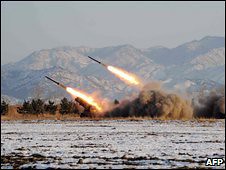
Missile launch in the Democratic People's Republic of Korea (DPRK) on April 5, 2009. The People's Republic of China urged calm while the US administration sought to promote alarm and condemnation. The DPRK conducted an underground nuclear test on May 25.
Originally uploaded by Pan-African News Wire File Photos
12:19 Mecca time, 09:19 GMT
N Korea 'at final uranium stage'
US officials have long suspected North Korea has been operating a parallel uranium weapons programme
North Korea is in the final stages of enriching uranium, the country's state media has said, a process that could give it a second way to make nuclear bombs.
According to the official Korean Central News Agency (KCNA), North Korean officials have informed the UN Security Council that the process of enrichment was entering "the completion phase".
The senior US envoy to North Korea, Stephen Bosworth, said the enrichment claim was "of concern".
"I think for all of us, it reconfirms the necessity to maintain a coordinated position on the need for complete, verifiable denuclearisation of the Korean peninsula," Bosworth said.
The country has already tested two plutonium-based nuclear weapons and has long been suspected of running a parallel effort to develop uranium-based weapons.
Reaction to sanctions
KCNA said the North's decision to push ahead with its nuclear programs was a reaction to Security Council's moves to tighten sanctions against the country following its second test of a nuclear weapon in May.
The report called the resolution a "wanton violation" of North Korea's sovereignty and dignity.
"We are prepared for both dialogue and sanctions," the report quoted a letter to the head of the Security Council as saying.
"If some permanent members of the [council] wish to put sanctions first before dialogue, we would respond with bolstering our nuclear deterrence first before we meet them in a dialogue."
The letter pointedly blamed the Security Council's decision to impose sanctions following its April rocket launch, while taking no action following one by South Korea last month.
"Had the UNSC, from the very beginning, not made an issue of the DPRK's (North Korea's) peaceful satellite launch in the same way as it kept silent over the satellite launch conducted by South Korea on August 25, 2009, it would not have compelled the DPRK to take strong counteraction such as its 2nd nuclear test," the letter said.
Agreements scrapped
The US, China, Japan, Russia and South Korea have been negotiating with North Korea for years in an effort to persuade North Korea to abandon its nuclear program in exchange for aid and other concessions.
However, North Korea walked away from the talks earlier this year, saying the so-called six-party process was dead and announcing that it was scrapping all previous agreements.
North Korea has said it needs nuclear weapons as a security guarantee against what it sees as the "hostile policies" of the US, which has 28,500 troops based in South Korea.
Balbina Hwang, a former US assistant secretary of state for East Asia and Pacific affairs, told Al Jazeera that North Korea's announcement was "reiterating the same message they have been sending since January, which is that they are not interested in six-party talks".
She said the North had decided the talks were not working for them, because it was going to force them to "a very critical step – namely were they going to give up their nuclear weapons or not?"
"What they're doing is telling the UN that sanctions will not work, that they will continue with weapons development of weapons of international rules, and instead that they'd rather deal bilaterally with South Korea, the US and China – because that's their best way of keeping the regime going and also being able continue with their nuclear weapons."
'Provocative'
South Korea's foreign ministry has expressed regret over the North's announcement, urging Pyongyang to return to the stalled disarmament talks.
"The North's move to continue provocative steps... can never be tolerated. We will deal with North Korea's threats and provocative acts in a stern and consistent manner," the ministry said in a statement.
Al Jazeera's Nick Spicer, reporting from the United Nations, said the North Korean statement will likely be seen as a defiant move, especially given that the US has just taken on the rotating presidency of the Security Council.
The US has said it will make non-proliferation the top priority of its time in the presidency.
Our correspondent says the North Korean announcement will also likely be seized upon by critics of the Obama administration to say policy that the White House's policy of engagement with North Korea and other so-called rogue regimes is a failure.
Source: Al Jazeera and agencies
No comments:
Post a Comment